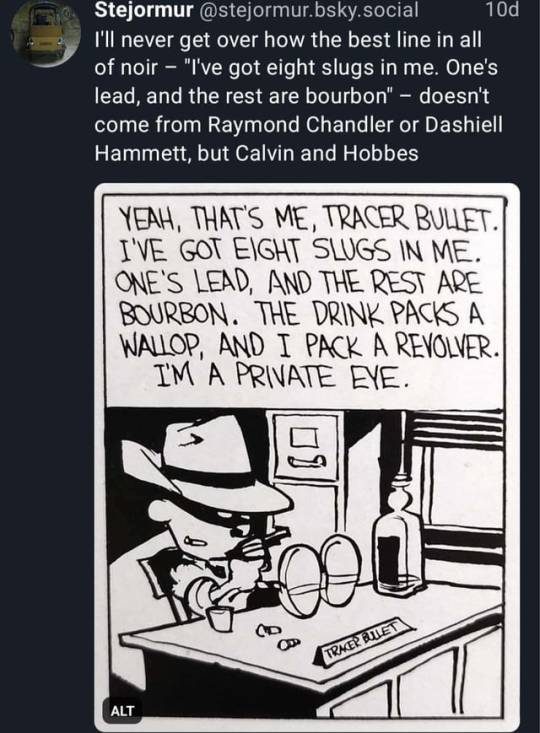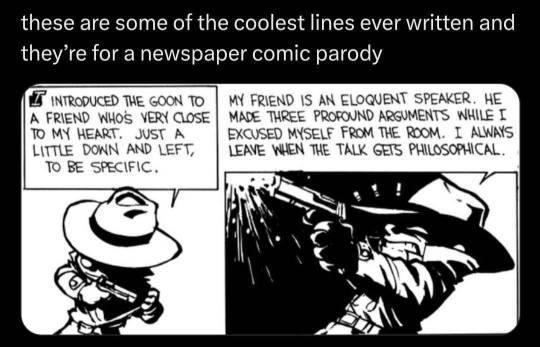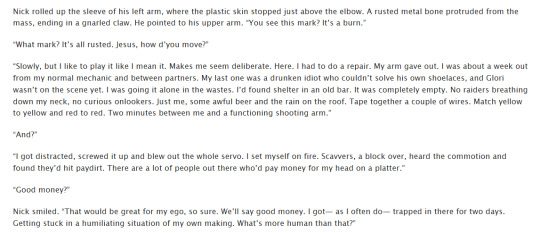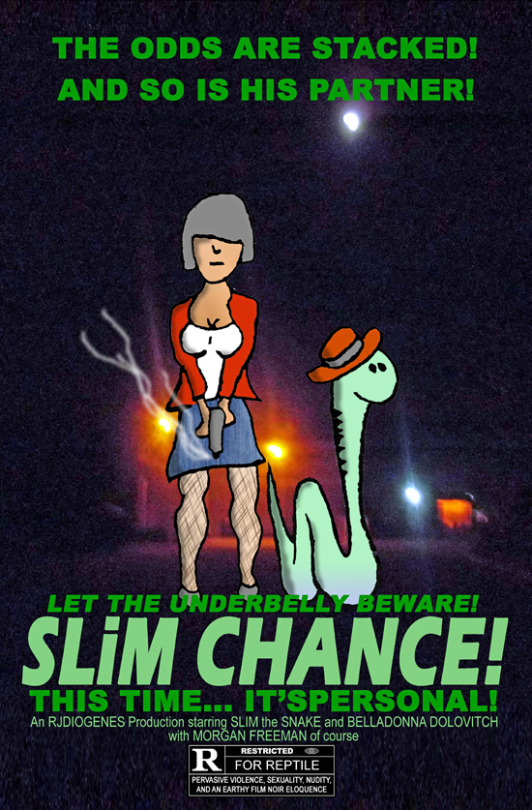#noir pastiche
Explore tagged Tumblr posts
Text
On April 22, 1989, Who Framed Roger Rabbit debuted in New Zealand.

#who framed roger rabbit#who framed roger rabbit?#robert zemeckis#christopher lloyd#judge doom#fantasy comedy#film noir#fanrasy film#noir pastiche#1980s#1980s movies#1980s nostalgia#national film registry#surreal comedy#comedy movies#cartoons#cartoon movies#movie art#art#drawing#movie history#pop art#modern art#pop surrealism#cult movies#portrait#cult film
5 notes
·
View notes
Text
Great Noir Episode art combined with great hard-boiled Private Eye Monologue - and both of those TV Tropes articles even use Tracer Bullet as header illustrations.
According to The Calvin and Hobbes Wiki, this is the last of Tracer Bullet's three appearances, so here are his first two.
The very first is a single day's strip, part of a larger arc involving a Really Bad Haircut, hence the hat.

The second strip is a week-long story about a Maths problem.
Remembering my own mathematical ineptitude, with 'O' Level results to prove it, one sympathises.

Shee you 'round, shweetheart.





96K notes
·
View notes
Text
i had a lot of fun writing the whole thing, but the teeny tiny excerpts i attach to posts aren't my 'favourite' parts per se, just what i think sums up that chapter best. little tasters. my favourite part of 3 was the nick and longfellow deadwife brigade convo. Old Man to Old Man Communication.

Old Man to Old Man Conversation
#dead man talking#dead woman walking#dmt#dww#nick valentine#fo4#fallout 4#the rule of noir pastiches is if somebody doesn't say something snappy every 8 words#legally a stranger is entitled to break your legs#i like the idea of a running bit where nick keeps getting trapped. it's very in keeping with the genre#the head injuries those guys take just to wake up somewhere else....
21 notes
·
View notes
Text

A Coat, A Hat, And A Gun Department:
In a world of Film Noir tropes and curious anachronisms, where Duesenberg Model A's coexist with smartphones, and space stations run on vacuum tubes and reel-to-reel computers, Slim the Snake and his unflappable partner Doll fight a never-ending battle against crime and corruption in Big City. SLiM CHANCE! was the first in a series of seven films featuring the hard-boiled, no-fisted hero and the phlegmatic femme fatale. Are they new films that homage the past or old films that predict the future? Hard to tell, because they only exist in an alternate universe where time passes differently than in ours, so you'll never get to see them. Tough luck, kid.
© 2024 Rick Hutchins
#alternate universe#pastiche#homage#fake movie poster#fake movies#film noir#detective fiction#rick hutchins#rjdiogenes
0 notes
Photo

Candy Rain
✎﹍﹍﹍﹍﹍﹍﹍﹍﹍﹍﹍﹍﹍﹍﹍﹍﹍﹍﹍﹍﹍﹍﹍﹍﹍﹍﹍﹍﹍﹍﹍﹍
Candy Rain is a show pony at the best of times. He loves showing off, though he isn’t too pressed about perfection. Very affectionate and friendly, there’s little this horse likes more than a friendly game and something sweet to share.
✎﹍﹍﹍﹍﹍﹍﹍﹍﹍﹍﹍﹍﹍﹍﹍﹍﹍﹍﹍﹍﹍﹍﹍﹍﹍﹍﹍﹍﹍﹍﹍﹍
Species; Equine, Peafowl-Friesian Gender; Stallion Color: Red Snowcone Mane: Melt, carries Striped Mutations/Markings; none
✎﹍﹍﹍﹍﹍﹍﹍﹍﹍﹍﹍﹍﹍﹍﹍﹍﹍﹍﹍﹍﹍﹍﹍﹍﹍﹍﹍﹍﹍﹍﹍﹍
Designed by; pastiche-noir Original; https://www.deviantart.com/pastiche-noir/art/Snowcone-Foals-1-0-3-CLOSED-548688532
Lineage: —————————————— SSS: UNKNOWN —————– SS: UNKNOWN —————————————— SSD: UNKNOWN Sire: DRR Sunshine and Lollipops —————————————— SDS: UNKNOWN —————– SD: UNKNOWN —————————————— SDD: UNKNOWN
—————————————— DSS: UNKNOWN —————– DS: UNKNOWN —————————————— DSD: UNKNOWN Dam: DRR Goodbye Ruby Tuesday —————————————— DDS: UNKNOWN —————– DD: UNKNOWN —————————————— DDD: UNKNOWN
#oc#original characters#equine#horse#peafowl friesian#horse oc#designed by: pastiche-noir#candy rain
0 notes
Text
Have You Read The Hallowed Hunt by Lois McMaster Bujold
It is so funny to me this time round how Ingrey thinks of himself as a noir detective protagonist (except his case is already solved) (and Bujold, as shown in Curse of Chalion, cannot write the self-pity straight) (someone on the page has to giggle with her at how Ingrey is Cursed and Doomed to Sorrow Forever through his Solitary Existence even if it's subtle)
anyway Ingrey is. Not exactly not a cop, but also kind of more like a spymaster's bruiser. His case is solved before he ever arrived. But there is further intrigue brewing.
i am a woman at war with herself, torn forever between my love of detective fiction and my hatred of cops and cop media
#idk if Bujold is on some level writing a pastiche of Bond or noir or neither#I also appreciate her dedication to writing dedicates of the Five Gods who do not fit their presumed demographic#consider: Ijada chosen one of the Sun#dy Cazaril chosen one of the Daughter#the Queen Mother chosen one of the Bastard#Tea and I once had a conversation plotting the once-mentioned gay eunuch as a chosen one of the Mother
66K notes
·
View notes
Note
100% of my jockey knowledge comes from reading Dick Francis books, have you read any/do you have any Thoughts on them?
TBH despite knowing nothing about horse racing I love his writing and plots, they are my comfort read! I especially enjoy how all his protagonists are Stoic Deceptively Intelligent men with high pain tolerance who fall in love with the female love interest at first sight... Original self insert Mary Sue lol
I thought, this is extremely funny, I will write you a funny little pastiche to show my stylish skills in mimicry and make you laugh!
I did actually feel pain, and I didn't think I liked being shot, but it didn't seem to matter much. In the past two years since the racing injury that had destroyed my hand in an unbelievably horrific way, I had only been able to listlessly pick up the rudiments of the most useless things: a master's degree in forensic pathology, unrivalled proficiency in one-handed lockpicking, an entire secret identity as a hard-hitting financial investigator, a deeply informed background in turf maintenance, international one-handed chess-playing fame, a one-handed pilot's license not relevant to the narrative, a full career arc as a noir private detective, one-handed photography skills, a stint as an undercover basketweaving instructor and a working knowledge of ancient Etruscan.
None of them mattered, because they didn't have horse racing in. Nobody wanted me, because I didn't either.
I didn't have any horse racing at all in me any more.
But then I was up all night with the toddler, and pastiche comes really fast for me, and it stopped being a Bit and started being A Lot. Maybe too much.
So I also became, apparently, the first person to use this tag on ao3:

And wrote you this:
https://archiveofourown.org/works/62461696
Which is of course a full parody of the whole 1965 Dick Francis thriller, “Odds Against,” and which I mostly wrote because the accordion joke struck me as shatteringly funny.
DOES THIS ANSWER YOUR QUESTION, I HOPE IT DOES.
425 notes
·
View notes
Text
I thought the big sleep and the big heat would similar films (b&w film noir, basically the same title) but the big sleep is basically a rom com and the big heat made me CRY FOR REAL!!!!
#debbie marsh u would have been a blorbo#the way she looks over her shoulder and SMILES as her boyfriend shoots her bc she knows she fucked his shit up irrevocably#until like a month ago my only exposure to film noir was thru pastiche#but now that i am getting into it….! the richness and diversity of the genre
0 notes
Text
One of my favorite gags so far in watching through all of Adventure Time is when Finn and Jake are doing a noir-pastiche, they get caught by mobsters, the mobsters declare that they're gonna feed them to the pig, and then they bring out a pig small enough to be carried underarm, and then the pig turns out to be a completely sapient talking animal who's made to eat people alive under duress. There are layers on that one
346 notes
·
View notes
Text
Well? I doubt that anyone would try to compete with Gary Lovisi’s The Baron’s Revenge? That hard-boiled Sherlock Holmes pastiche is the very definition of ANGST. And obviously, a sequel for ACD The Illustrious Client.
And the final act? Holy smokes. The Three Garridebs is a tea party compared. It’s a (queer) Sherlock Holmes pastiche classic for decades.
And when you really want to go on the ANGST TRAIN, there’s always Sherlock Noir. It’s a complete subgenre of pastiches. Well established.
My mind is full of wild ideas for Holmes and Watson angst fics, but I’m not great at writing, so I’m sharing them for someone else to try.
Imagine in The Illustrious Client, Watson changes his mind and goes after Holmes, only to find him beaten up and bloody on the street, with blood pouring out of his mouth.
Now imagine Watson SUCKING the blood from Holmes’s mouth to stop him from choking—and then being completely traumatized by the experience afterward..
#acd canon#sherlock holmes#john watson#It’s simple hard-boiled and Sherlock Noir#it’s a subgenre of pastiches#and the classics are a classics for a reason
22 notes
·
View notes
Text
On March 25, 2003, Who Framed Roger Rabbit? was released on Special Edition DVD in the United States.

#who framed roger rabbit#robert zemeckis#christopher lloyd#judge doom#fantasy comedy#film noir#fantasy film#noir pastiche#national film registry#1980s#comedy movies#satire#80s nostalgia#surreal comedy#crime comedy#crossover film#art#movie art#drawing#movie history#pop art#modern art#pop surrealism#cult movies#portrait#cult film
2 notes
·
View notes
Text
days are getting shorter. there's ice forming on the bay. the sky is a strange, steel-blue with muted streaks of pink, and orange, and purple. a morose pastiche of autumn's downfall made by a child as they smear crushed bluebonnets across a watercolour canvas of bruised, over-ripened peaches melting into the horizon. a chill in the air. the smell of moose chili on the stove.
i want something full of empty spaces for that weird, blue-orange cusp of winter. the fistsized ache of loneliness weeping off the pages, and falling into the hardened muskeg below.
maybe Price washes up on the shores of your isolated hamlet. why he's there, what he's doing, is as much of a mystery as he is. layered deep in secrecy. but he's the odd man out here—someone who doesn't belong.
(but it's okay, because you don't really feel like you belong, either.)
it's all happenstance, really. he rolls into town with his broad shoulders and gruff, curt words; a harsh, uncrossble distance etched in pale blue. but he isn't the only one who burns hot, and you match his fire with your own.
in that wild, untameable blaze, you find something you've been missing, like a steady trickle, dribbling down like sticky sap into a metal pail. childhood nostalgia of dipping a stick into the bucket, and rolling it over snow. maple taffy. sweet and comforting. a scarf that smells of fresh wool.
(maybe he does, too.)
but his stay comes with an expiration date.
you have to remind yourself not to forget that.
it's just easier said than done when all the pieces he gives you are exactly what you've been looking for this whole time.
OR: angst. secrets. culture-shock. hunting. this might end up as a bear-spirit/shifter John Price fic but i really love the idea of human!John Price running from his past and into the arms of NAPs officer Reader who puts the pieces together (murder mystery, mayhaps), and has to grapple with your own sense of morality—turn Price in to the corrupt cops, or hide a fugitive in your home. very fargo-noir.
#re: its cold outside and i want to read something that hurts#no plot just vibes#john price x reader
74 notes
·
View notes
Note
Is your fic posted on AO3? o: I'd love to read it!
you certainly can, and it is!!
9 notes
·
View notes
Text
A Nick Valentine fan can laugh but a Hancock enjoyer may only chuckle.
When your boy is popular but it's in the x reader fic way not the richly textured multi chapter fic written by slightly strange obsessives with niche college degrees and a classic lit hyperfixation way.
44 notes
·
View notes
Text
i think people who think MKM was bad because it leaned too hard on the genre pastiche have the wrong end of the stick honestly. imo the biggest problem was that it missed the mark on the genre. like, take the thing everyone complains about, which is that there were a billion out-of-place detectives in similarly out-of-place 20s noir outfits. and, like--i mean, what murder mystery have you ever seen that has 40+ detectives? one detective is a classical murder mystery. two, even three detectives can still be a classical murder mystery. above that, you're getting into the, like, 'isolated country house where everyone is both a potential suspect and a detective in their own right' territory. by the time you're at double digit numbers of detectives, that's not a murder mystery anymore, that's a police procedural, a genre space in which the meaning of 'detective' is fundamentally different.
98 notes
·
View notes
Text
CLOCKS DESTROYED: 5/1000
(page 1155-1172)


SO. THIS INTERMISSION, HUH. It’s all laid out pretty clearly. The Midnight Crew are trying to rob the Felt’s vault as revenge for the Felt robbing a casino they like (which we’ve already seen on page 833), and any amount of death and clock destruction along the way is just a bonus. It’s a sort of hardboiled noir villain pastiche, nobody here has any morals or is any worse than each other, and narratively the tone is more sarcastic and mean – ‘all aboard the idiot wagon!’ (p.1165) and ‘[i]t is for little children who poop hard in their baby ass diapers’ (p.1167). Time is important, games are important, and the mysterious leader Lord English is important.
It’s a lot of fun reading the point of view of an intentional villain – the narration has that slight over the top ridiculousness that makes it easy to get swept along in these schemes and also want to see these dead green torsos, in contrast to the Midnight Crew’s brief appearances in Acts 1-3, where we saw them externally and they seemed pretty stupid.
I know as well that there’s a lot of references to Problem Sleuth here – the inventory system, the hats full of candy, the item duality, the suggestion to build a fort, etc – which I’ll be reading in full soon so I’ll talk more about that then.
While the plot seems straightforward, there’s a couple hints to the contrary, especially ‘Best to avoid DIE (6) in any direct confrontations unless you want a temporal mess on your hands’ (p.1170). The Felt engage in ‘despicable time shenanigans’, and this is probably why the mansion has a thousand clocks that all need to be smashed – including the one Slick brought in with him. Without timekeeping abilities, it’s harder to mess with time. There’s also the fact that Slick either can’t or won’t kill SNOWMAN, the potential ‘significance’ of the rules card to blackjack (p.1169), and of course the connection between Spades Slick and Jack Noir.

Slick doesn’t recognize humans – the picture beneath the rug is right-wing comedian Jeff Foxworthy, and the laptop is Bing Crosby – while Jack has intimately encountered Dad Egbert, also a human. Jack liked the name Spades Slick but didn’t recognize it as his own – although it’s possible he could have been renouncing an old name, saying he’s no longer that person. And when Slick loads mspaintadventures, he reads actual Homestuck, not just the low poly Homestuck intermission from the Midnight Crew. So some kind of parallel universe might be more likely than progression through time, or even time travel.
Just having the Crosbytop is another link to Dad Egbert, who had the Bing Crosby photograph in his room. That photo plus any laptop would alchemize the Crosbytop. I love the idea that some of the Midnight Crew’s possessions could be things the kids have alchemized that got moved around through time and space – Slick’s hat is a regular hat, but could also be Dad’s hat + some oil collected from an imp. (side note: having a backup hat is such a Dad Egbert thing to do.) (side side note: if Dad kept candy in his hat, would it be Gushers, to combine his two great loves of his son and Betty Crocker?)
Slick doesn’t understand the term ‘captchalogue’, but does have an inventory system – and he has a rules card for blackjack which has a bar code on the reverse, not unlike how captchalogue cards have captcha codes. The card is also a key, so presumably the code can be scanned to unlock something, similar to how captcha codes can be used to create items. He also has a similar bar code on his arm (p.1163) just like the one on WV’s arm (p.677), although WV had no inventory system at all besides picking things up, and he recognized humans (John) immediately.

In the heist plans, Slick’s ���heavy muscle and expert safecracker, Boxcars, is headed straight down to the vault’ (p.1172). There’s a small image of the vault here, and if I’m not VERY mistaken, we’ve seen ‘Boxcars’ with this vault before – carrying it to contain Dad Egbert (p.957). So this vault may also have traveled in time, or passed back and forth between the two gangs, or appearified, or SOMETHING. The link between these stories really isn’t obvious to me but I’m enjoying the mystery of it.
The intermission is incorporating color into the narrative text, especially green, which is used for ‘THE FELT’ and ‘LORD ENGLISH’ (p.1155), and all the individual Felt names (p.1170-1171) besides the O in SNOWMAN. Other colors are used for the Felt’s numbers, matching the colors of their hats. This isn’t the first instance of color in the narrative text – Jade’s red ‘<3!!!!!!!!!!!!!!!!!!!!!!!!!!!!!!’ to her grandpa on page 919 jumps to mind – but it’s VERY rare outside of characters’ notes and chatlogs, so stands out here. That shade of bright spring green is also very similar to the green on the Sburb logo and on John’s shirt; the only color seen on page 1. So, green in general, or this specific green, might have some overall significance. It definitely links the Felt to being Sburb NPCs, same as the Midnight Crew – could they be the inhabitants of the planet John’s on, and he’ll get to interact with versions of them in Act 4?
As further evidence for this, Sburb NPCs all seem linked to long-established analog games – WV, PM, and the light and dark kingdoms have been linked to chess (p.423-4, 721, 844; modern ruleset invented ~1500), while the Midnight Crew are linked to playing cards (modern deck invented ~1500s), and the felt to pool (invented ~1400s). This is different to the beta kids – John, Rose and Dave are all linked to in-universe video games such as Sburb, Problem Sleuth, And It Don’t Stop and Grand Snack Fuckyeah as well as John’s full collection on page 31. Jade as usual is a weird outlier who exists somewhere between the two, and is linked to real world board games, which are more modern (at least in their trademarked, commercial forms) – see page 772. Games are definitely a key motif in the story, so I’m keeping track of what games characters are linked to, and which characters don’t play games at all (Dad Egbert??)
#homestuck#reaction#changed the blog title! url will always stay the same but I figure I can mess with the title when it makes sense for the story!#chrono
22 notes
·
View notes